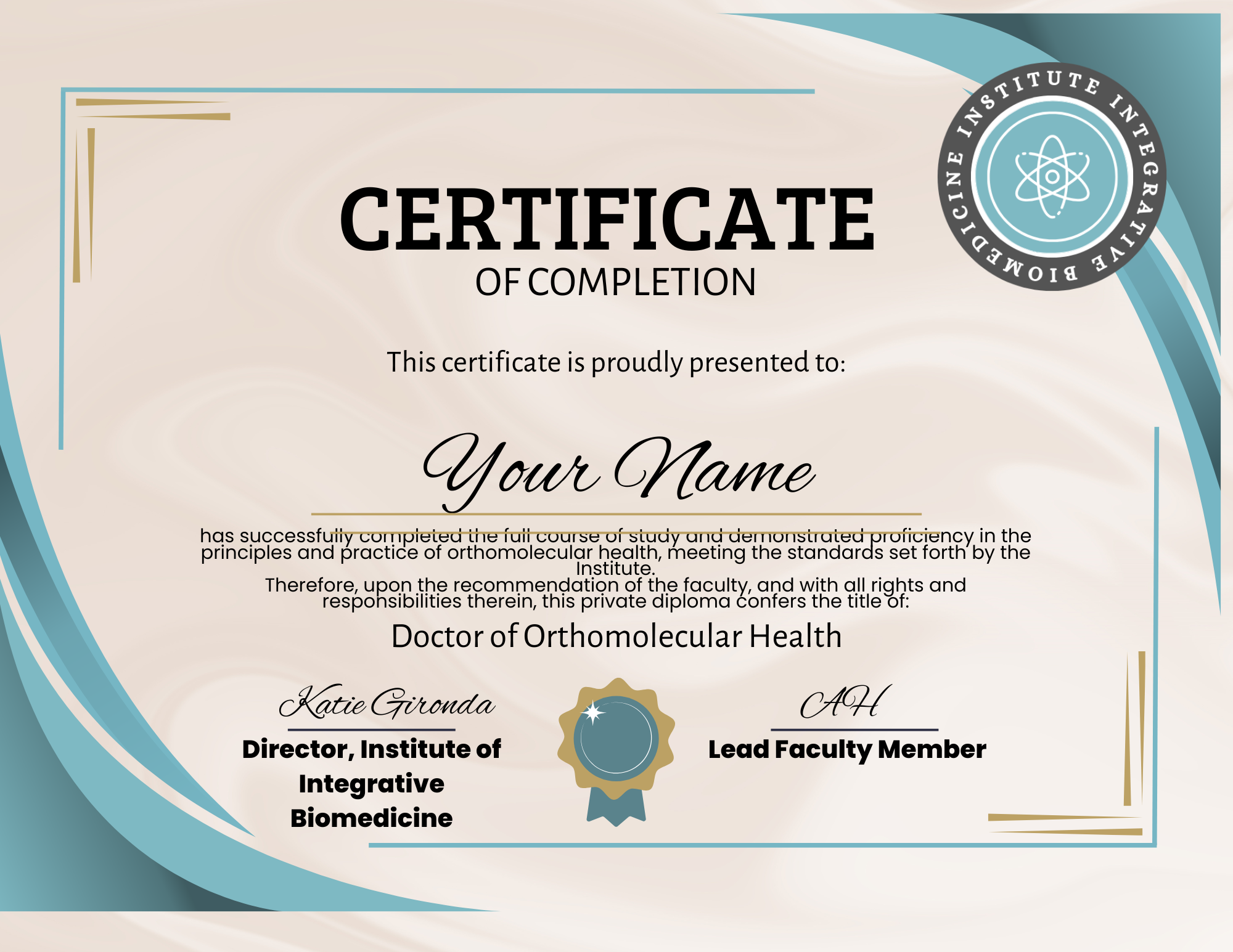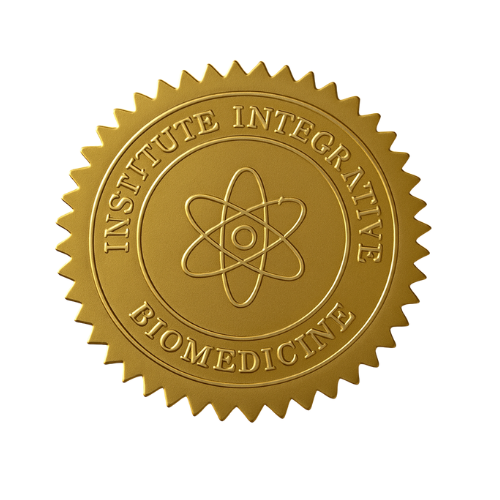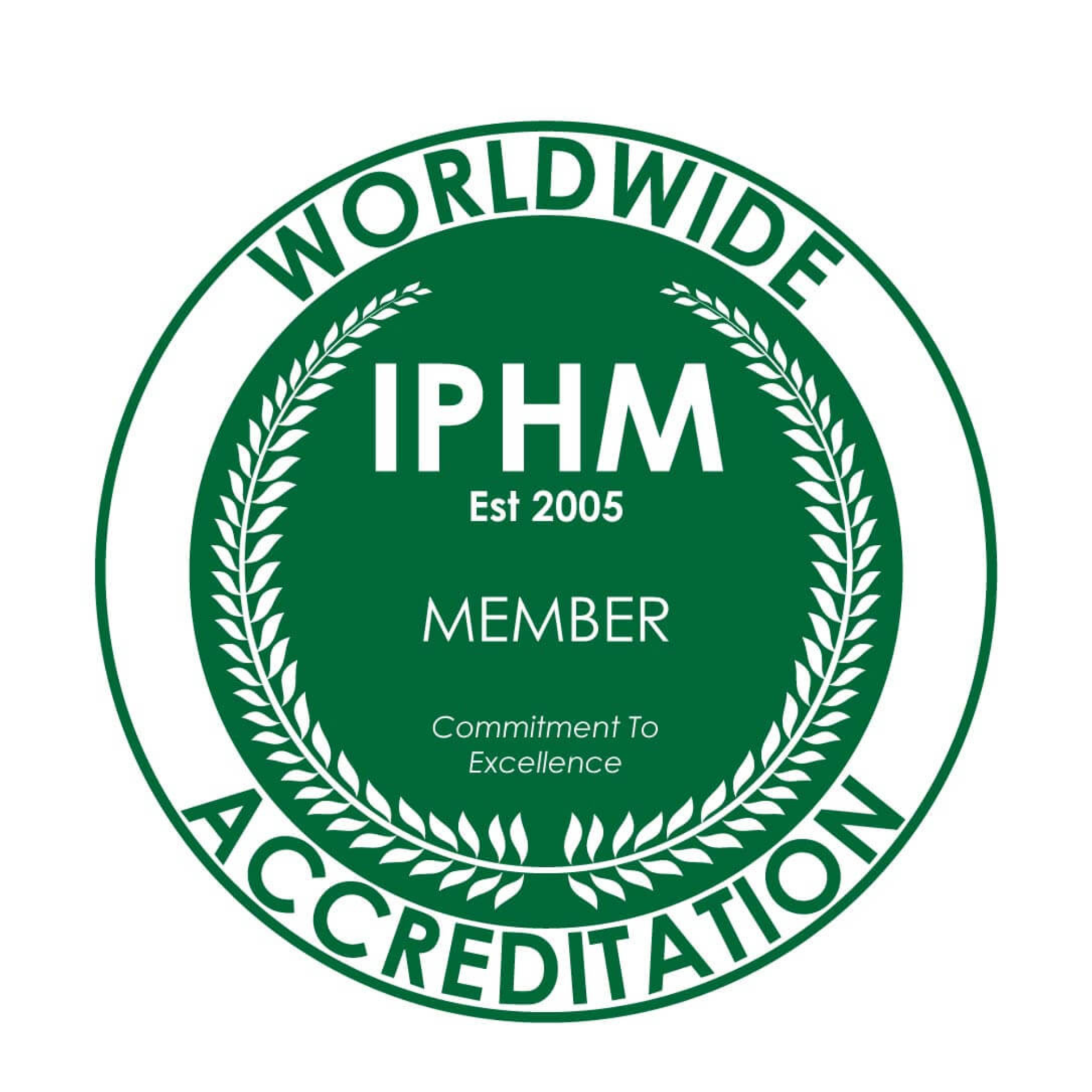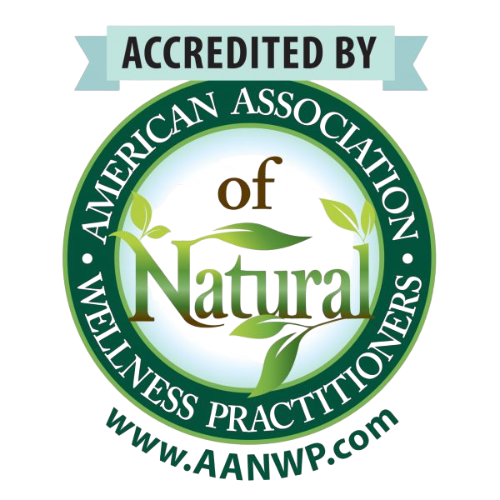
The Institute of Integrative Biomedicine is a private educational institution committed to advancing the science and practice of natural, nutrient-based healing. We offer doctorate-level training rooted in integrative biomedicine, orthomolecular science, and nutritional biochemistry. Our mission is to educate and empower the next generation of holistic health professionals, wellness leaders, and biomedical pioneers through rigorous, evidence-informed programs. Whether you're a practitioner, educator, or passionate advocate for natural health, we provide the knowledge, mentorship, and tools needed to transform lives through the power of biology, nutrition, and functional healing.
At the Institute of Integrative Biomedicine, our training is created by leading experts in integrative health, orthomolecular science, functional medicine, and therapeutic nutrition. Our instructors bring decades of experience in clinical practice, research, and holistic education, bridging the groundbreaking work of pioneers like Linus Pauling and Abram Hoffer with today’s most advanced approaches to nutrient-based healing. Students benefit from expert-led lessons deeply rooted in the practice of integrative biomedicine. We don’t just teach theory, we teach transformation through applied, evidence-informed learning.
The Institute of Integrative Biomedicine stands apart for its depth, integrity, and commitment to science-based natural healing. Our doctorate-level programs blend rigorous academic training with holistic principles, empowering students to think critically, lead ethically, and make meaningful contributions in the evolving field of integrative health. Through flexible online learning, expert mentorship, and real-world clinical frameworks, we prepare students not just to earn a title—but to create lasting impact. Whether you're beginning your journey or advancing your mission, we’re here to support your growth every step of the way.
Legal Use of the Title "Doctor of Orthomolecular Health"
A Guide for Graduates of Our Doctoral-level Program
Our Institute is not accredited by a government or CHEA-recognized body. This Doctorate program is privately organized.
This is a professional diploma from a private educational Institute.
As a graduate of our Doctorate in Orthomolecular Health program, you’ve earned a significant academic and clinical distinction. However, using the title “Doctor” in professional settings must be approached with a clear understanding of legal, ethical, and jurisdictional boundaries.
This guide will help you navigate the appropriate use of your new title ensuring that your designation is transparent, compliant, and respected.
Upon completion of our doctorate program, you may lawfully use the academic title:
Doctor of Orthomolecular Health (DrOH)
or
(DOH). (if your jurisdiction and licensing context allow)
You may also refer to yourself as:
Dr. [Your Name], Doctor of Orthomolecular Health
Dr. [Your Name], Orthomolecular Health Practitioner
Dr. [Your Name], PhD/Doctorate in Orthomolecular Health (Non-Medical)
Important: This doctorate is not a medical doctorate (MD, DO, DC, ND), and does not grant you the legal right to diagnose, treat, or prescribe unless you hold a separate healthcare license that allows it.
How to Legally Use the Title “Doctor"
1. Academic and Professional Use (Allowed)
You may use the title “Doctor” in the following ways, as long as you clearly indicate your field and scope:
On business cards, websites, books, and social media:
"Dr. Jane Smith, Doctor of Orthomolecular Health"
In educational settings:
“I hold a doctorate in Orthomolecular Health. I am not a licensed medical doctor, but I specialize in evidence-based nutritional interventions.”
As a health educator, consultant, author, or public speaker, provided you disclose your qualifications and avoid misleading the public.
In correspondence, include post-nominals:
"Jane Smith, DrOH" or "Jane Smith, D.O.H."
2. Disclosures Required
Always disclose the non-medical nature of your doctorate. For example:
“I am a Doctor of Orthomolecular Health. I am not a licensed physician. My role is educational and consultative in nature.”
3. Avoid These Illegal or Misleading Uses
You cannot:
Use the title “Doctor” in a clinical or therapeutic setting in a way that implies you are a medical doctor, chiropractor, naturopath, or psychologist, unless licensed accordingly.
Represent yourself as a licensed health care provider unless you hold a state-recognized license (e.g., RN, ND, MD, etc.).
Use terms like:
“Primary care”
“Functional medicine physician” (unless licensed)
“Treats disease” (unless licensed)
“Prescribes supplements for conditions” (this may cross into medical territory).
Always verify with:
Your local health regulatory board
Consumer protection laws in your state or country
Professional associations (e.g., AHNA, NANP, CHNC, ION)
If you work in Canada, for instance:
Ontario’s Regulated Health Professions Act (RHPA) prohibits use of "Doctor" in a health context unless licensed.
Alberta and B.C. allow limited use with disclaimers.
In the U.S.:
Some states prohibit unlicensed individuals from using "Doctor" in any healthcare-related advertising.
Other states allow use in educational or research contexts if clearly disclosed.
Protect Yourself: Best Practices
Add Disclaimers
On all public materials (website, email, social media, podcasts), state:
"This information is for educational purposes only and is not a substitute for medical advice. I am not a licensed medical provider."
Clarity Over Credentials
Always clarify your scope:
“I hold a Doctorate in Orthomolecular Health, focusing on nutritional education and wellness consulting.”
Join Professional Bodies
Consider joining:
Orthomolecular Medicine Society (OMS)
Complementary health educator organizations
International practitioners’ networks that recognize doctorate-level education.
Get professional liability insurance under the category “Health Consultant” or “Educator”
Have your materials reviewed by a health law attorney in your region
Remember
You are joining a growing global movement of doctorate-level professionals specializing in nutritional medicine and cellular health. Your legal, ethical, and transparent use of your title builds trust, advances orthomolecular science, and protects your professional standing.
When in doubt, clarify.
When promoting, disclose.
When practicing, educate.
In the United States, the use of the title "Doctor" in healthcare-related contexts is regulated at the state level, and several states prohibit unlicensed individuals (those without an MD, DO, DC, ND, DPT, etc.) from using the title "Doctor" in any way that implies medical licensure or healthcare authority.
Here are states known for having strict regulations around the title "Doctor" in healthcare contexts:
STATES WITH RESTRICTIVE LAWS ON "DOCTOR" TITLE USE IN HEALTHCARE CONTEXTS
1. California
Business and Professions Code § 2054:
It is illegal to use the term "doctor" or "Dr." in a way that implies you are a licensed physician or surgeon unless you are an MD, DO, or hold a license under a different recognized healing art (e.g., DC, ND).
Even PhDs must clarify that their doctorate is not a medical license.
Misleading use can result in fines or criminal charges.
2. Florida
Statute § 456.072 & § 817.505 (Health Care Fraud)
Using the title “Doctor” in advertising or patient interaction without holding a Florida healthcare license (MD, DO, DC, etc.) is considered unlicensed practice and is a felony.
Must clearly and prominently disclose non-licensed status if using “Dr.” in any health-related context.
3. Illinois
Medical Practice Act, 225 ILCS 60/
Use of "Dr." is prohibited in any healthcare-related advertising or practice unless you hold a valid license as a physician or under another regulated profession (e.g., psychologist, dentist).
PhDs or unlicensed health consultants must include disclaimers and avoid implying clinical authority.
4. Texas
Texas Occupations Code § 104.004
The title "Doctor" or "Dr." in any form of advertising related to health services must clearly indicate the degree held and that the individual is not a licensed physician.
Failure to disclose appropriately is considered deceptive and may be prosecuted under deceptive trade practices.
5. New York
Education Law § 6530 and § 6512
It is a criminal offense to imply you are authorized to practice medicine using the title "Doctor" if you are not licensed.
Non-licensed individuals using “Doctor” in health contexts must be crystal clear about their role and degree type.
States with Moderate Restrictions:
Other states (e.g., Arizona, Georgia, Michigan, Pennsylvania) allow use of “Doctor” with proper disclosure but will penalize misleading use if there’s consumer confusion or harm.
Best Practice for All States
Regardless of the state:
Use “Doctor of Orthomolecular Health” only in academic, educational, or consulting contexts.
Include disclaimers like:
"Not a licensed medical provider. Services are educational and not intended to diagnose, treat, or cure disease."
Avoid any appearance of practicing medicine unless you are licensed under that state's scope of practice laws.
INTERNATIONAL USE OF THE TITLE “DOCTOR”
For Graduates of the Doctorate in Orthomolecular Health
GENERAL RULE
Most countries permit the academic use of the title "Doctor" (Dr.) provided the following conditions are met:
The title is not used in a manner that misleads others into believing the individual is a licensed medical or clinical professional.
The field and nature of the doctorate (e.g., orthomolecular health, nutrition, education) are clearly stated.
There is no implication of the authority to diagnose, treat, prescribe, or provide medical services unless the individual is duly licensed.
COUNTRY-BY-COUNTRY OVERVIEW
Canada
Title Use: Regulated by province.
Ontario: Under the Regulated Health Professions Act (RHPA), only certain health professionals (e.g., MD, ND, DC, DDS, psychologists) may use “Doctor” in a healthcare context. Graduates without such licensure may not use “Dr.” when engaging with clients in a health capacity.
Alberta and British Columbia: More permissive, but disclaimers are required. Individuals must clearly state that their doctorate is non-clinical and does not permit diagnosis or treatment.
Recommended Disclosure: “I hold a doctorate in Orthomolecular Health. I am not a licensed health care provider under provincial law. My work is educational and consultative.”
United Kingdom
Title Use: Permitted in academic and professional settings. Not allowed in healthcare advertising or client services unless the person is licensed (e.g., with the General Medical Council).
Misleading the public about being a “medical doctor” is illegal under consumer protection and healthcare advertising laws.
Recommended Use: “Dr. Jane Smith, Doctor of Orthomolecular Health (non-clinical)”
Australia
Title Use: The term “Doctor” is regulated by the Australian Health Practitioner Regulation Agency (AHPRA).
Individuals without medical or allied health registration cannot use “Dr.” in a health-related setting unless they provide clear disclosures and do not imply clinical authority.
Academic and non-clinical use is allowed, provided scope is stated.
Recommended Use: “Doctor of Orthomolecular Health (educational consultant, not a registered health practitioner)”
New Zealand
Governed by the Health Practitioners Competence Assurance Act (HPCA).
Use of “Doctor” in health service promotion or practice is restricted to licensed practitioners.
Academic use is generally acceptable, but not in a therapeutic context.
Always disclose the non-clinical nature of your doctorate if involved in health-related education or consulting.
Germany
Use of the title “Dr.” is highly regulated.
Only individuals whose doctorate is awarded by a German university or formally recognized by state education authorities may legally use “Dr.” in front of their name.
Foreign degrees must be officially recognized (nostrified) before the title can be used in public or professional contexts.
Recommended Format: “Jane Smith, Doctor of Orthomolecular Health (USA)” or “PhD (USA)”
France
The title “Docteur” is reserved for holders of French doctorates or individuals whose foreign doctorate has been officially recognized.
Recognition may be granted through the ENIC-NARIC credential evaluation system.
Using the title “Doctor” in public materials or services without recognition may violate French academic title laws.
Use academic credentials in full, avoid abbreviation to “Dr.” unless authorized.
India
“Doctor” is culturally and legally associated with medical professionals (e.g., MBBS, BAMS).
Use of “Dr.” by non-licensed individuals in a health-related context may result in allegations of unlicensed practice or misrepresentation.
Academic use of “Doctor” is acceptable in teaching, writing, and non-clinical consulting, but must be accompanied by a disclaimer and proper identification of the degree field.
South Africa
Academic doctorates may use the title “Doctor” in non-clinical contexts.
The Health Professions Act prohibits unlicensed practice of medicine or use of titles that imply medical licensure.
Use the full title “Doctor of Orthomolecular Health” with disclosures when working in nutrition, wellness, or educational roles.
BEST PRACTICES FOR ALL COUNTRIES
Always disclose the field of your doctorate. Avoid using “Dr.” without stating "Doctor of Orthomolecular Health" or the equivalent.
Never claim to diagnose, treat, or prescribe unless you are licensed to do so in your country or jurisdiction.
Add disclaimers on websites, business cards, and publications:
“Not a licensed medical practitioner. Services are educational and not intended to diagnose, treat, or cure disease.”
Understand and respect national laws regarding the protection of medical titles and healthcare advertising.
Consult local legal counsel or regulatory bodies if unsure whether your use of “Doctor” is compliant in your region.



